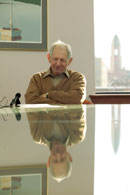Talk To Me
Andrea L’Hommedieu is raising her voice to an elderly alumnus. But not to worry. Bates’ oral historian is neither condescending to nor scolding Irving Isaacson ’36. (And if she were, this Lewiston lawyer and World War II spy could certainly take care of himself.)
Instead, it’s all about the tape. L’Hommedieu is recording an interview with Isaacson for the Bates College Oral History Project and, with the microphone directed away from her, is ensuring that the transcriptionist can hear her clearly. It’s typical of the care that, along with a genuine fascination with her subjects, L’Hommedieu brings to her work.

Isaacson is L’Hommedieu’s first interviewee for the project, an initiative marking Bates’ Sesquicentennial this year. At least 40 other Bates people will also sit for L’Hommedieu’s microphone — alumni, staff, friends, and faculty sharing eight decades’ worth of College memories.
Over the 18 months of the project, L’Hommedieu’s interviews will be transcribed, annotated, and preserved in the Edmund S. Muskie Archives and Special Collections Library. They will join the 440 interviews conducted since 1998 for the Edmund S. Muskie Oral History Project, which ended in December, as well as materials from an earlier Bates-focused oral history initiative.
Why oral history? From the correspondence of founder Oren Cheney to the records of the Stanton Bird Club, the archives hold all manner of documentary material telling Bates’ story. But oral history brings an essential human vibrancy to those dry papers.
“These are people telling you what it was like to be there,” says L’Hommedieu. “You get what their feelings were about it. You hear their voices, their inflections.”
Moreover, she says, oral histories “provide clues that lead you to the hard facts.” Though memory gaps and personality quirks can make the facts in an interview suspect, those same quiddities can serve history in and of themselves. If five interviewees all associate the same wrong date with an event, the reason why might be important.
L’Hommedieu quotes Alessando Portelli, an influential Italian oral historian: “Oral sources tell us not just what people did, but what they wanted to do, what they believed they were doing and what they now think they did.”
Oral histories also build bridges — between the people at Bates now and the ones who came before, between visiting researchers and the College, and between the archives and the campus community as a whole. And if those relationships lead to donations of important personal papers, memorabilia, and ephemera to the archives, so much the better.
“I also hope that the project will raise awareness about the importance of oral history generally,” adds Katherine Stefko, archives and special collections director. The Muskie project, directed by the late U.S. senator’s longtime associate Don Nicoll, had the incidental effect of establishing at Bates the capacity to gather oral history. That benefited not only the archives but the academic offerings.
“I think we’re unique in having a professional oral historian on staff,” says Stefko. L’Hommedieu has coached classes in gathering oral history, and this summer will issue an updated edition of the oral history manual developed during the Muskie project.
The project is feeding the Sesquicentennial celebration, too. Each month L’Hommedieu posts a new interview excerpt on a page linked to the “Ses-Q” Web site. She and Stefko hope to supply audio snippets to historical exhibitions on campus, as well.
“I want to ask people: When you went out into life, what was it that Bates College gave you?” L’Hommedieu says. “What was the sense you had from being at Bates? How did Bates serve you?”
She came to Bates in January 1998 for the Muskie project. A Maine native and former children’s librarian in Falmouth and Westbrook, she was hired as project assistant. Transcriptionist Nicci Leamon came on at the same time.
Although L’Hommedieu had no formal background in oral history, she proved to have the right stuff intellectually and personally. “She’s comfortable with a broad range of folks, and she makes them comfortable,” says Stefko. “She has an extraordinary memory for the people she’s met and their relationship to Bates, so she knows the right people and the right questions to ask.”
At the same time, though, “I like to let them digress,” L’Hommedieu says. “They know more about what they know than I do. If I let them continue, they often take me to a place I never knew to ask about.”
On this sunny December day, in the fourth-floor conference room in Irv Isaacson’s law office, L’Hommedieu asks about his trips with the debate team.
“Bates was pretty provincial,” he says, gazing into the air as if his answers were there. “It was a big deal for us to come out of the country, so to speak, to go to Boston or New York.” A smiling L’Hommedieu watches intently as Isaacson speaks.
“I love stories,” she says later. “That’s the key for me.” College memories.
By Doug Hubley
dhubley@bates.edu